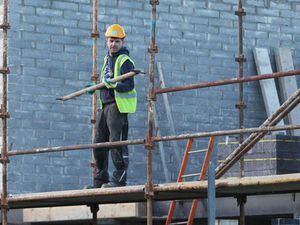Construction sector contracts in March after ‘Beast from the East’ blow
The Markit/CIPS UK Construction purchasing managers’ index (PMI) sunk to 47.0 last month.

Output in the UK construction sector has taken a battering from Britain’s freak cold snap, causing the industry to contract in March.
The Markit/CIPS UK Construction purchasing managers’ index (PMI) sunk to 47.0 last month, down from 51.4 in February, with economists expecting a figure of 51.0.
A reading above 50 indicates growth.
The bouts of heavy snow took its toll on civil engineering work, which experienced its steepest fall for five years.
The disruptive conditions also hit the wider sector, with site activity and access to staff being hampered by the weather.
Sterling was up versus the US dollar at 1.407 dollars following the update. Against the euro, the pound was marginally lower at 1.14.
Tim Moore, IHS Markit associate director, said a sold jump in employment ensured it was not all doom and gloom for the construction sector in March.
He said: “The construction sector continued to experience subdued business conditions during March, but snow-related disruption was a key factor behind the marked decline in activity on site reported by survey respondents.
“Total construction output fell at the fastest pace since July 2016, driven by the sharpest reduction in civil engineering activity for five years and a renewed fall in commercial work.
“House building increased slightly during March, although the rate of expansion was still softer than at any time in 2017.
“A solid rise in employment numbers and the rebound in business expectations to a nine-month high provide an indication that construction activity will strengthen over the near-term.”
The survey said that despite a “soft patch” in new work employment growth accelerated to a three month high, with additional hiring chalked up to upcoming project starts and “long term business expansion plans.”
But this was also linked to the drop in the availability of subcontractors, whose prices rose at the strongest pace since September.
Raw material costs also increased in March, due in particular to the higher price of metals and insulation, though the overall rate of input cost inflation softened to a 20 month low.
Some companies said they experienced a “moderation” in price hikes by suppliers which had been due to the weak pound.
The overall drop in activity, however, may have been caused by additional factors not mentioned in the survey, according to Howard Archer, chief economic advisor of the EY ITEM Club.
“It is also very possible that there was some fall-out from the collapse of Carillion,” he said, referring to the construction and outsourcing firm which went bust in mid-January.
“The construction sector’s difficulties in recent months has clearly been influenced by economic, political and Brexit uncertainties fuelling clients’ caution over committing to new projects.
“Lacklustre economic activity in some sectors of the economy (such as retail) has also weighed down on construction, as has a shortage on new infrastructure projects,” he added.





